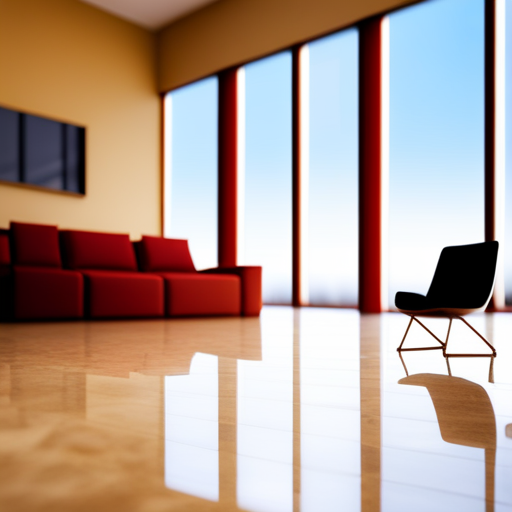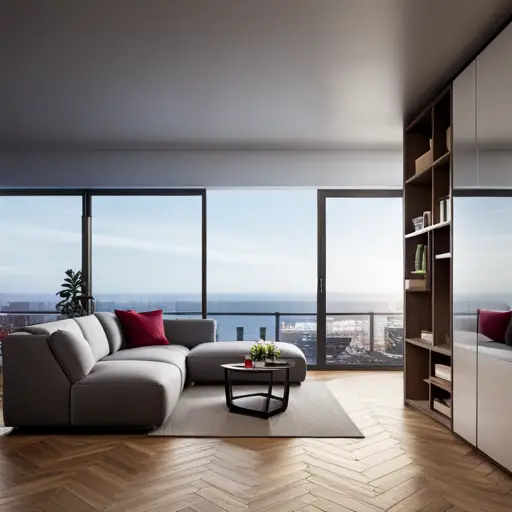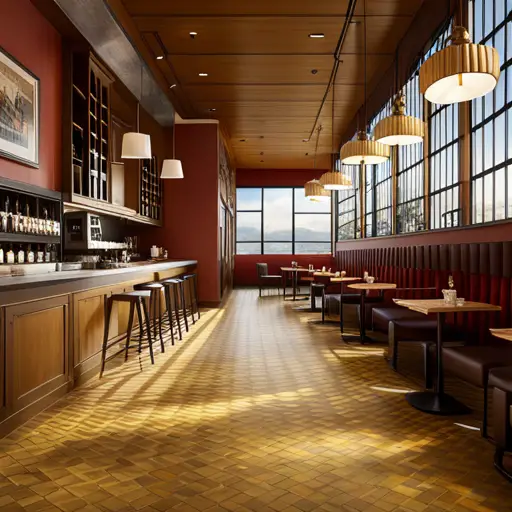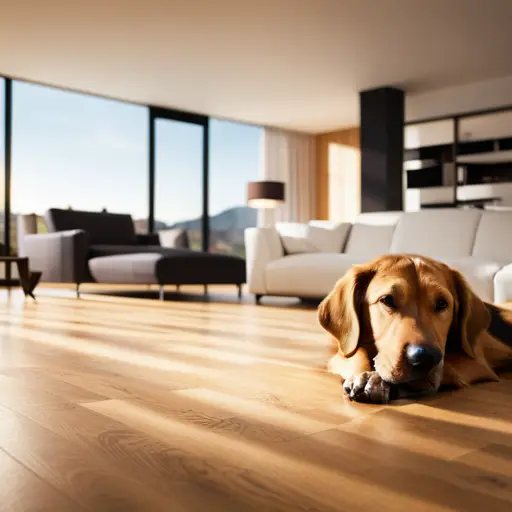The Appeal of Hardwood Floors in the Real Estate Market
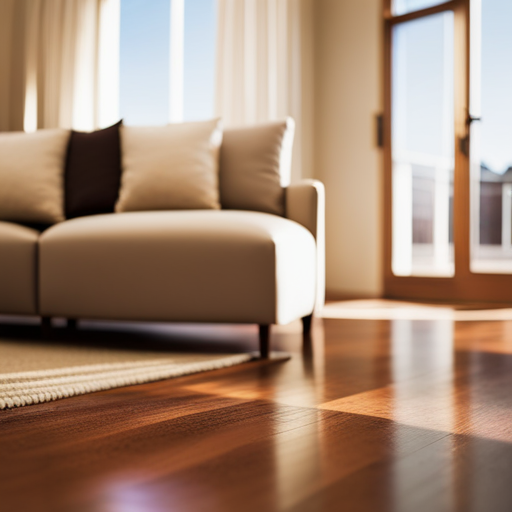
Like the solid foundation of a well-designed home, hardwood floors offer timeless elegance and enduring appeal in the real estate market.
Beyond their aesthetic charm, these floors also provide numerous practical benefits, such as increased property value, low maintenance, and health advantages.
In this article, we will explore the undeniable allure of hardwood floors and their ability to enhance the desirability and value of any property in the competitive real estate market.
Timeless Aesthetic Appeal
Hardwood floors possess a timeless aesthetic appeal that adds sophistication and elegance to any property. Their timeless beauty and classic elegance make them a popular choice for homeowners and real estate investors alike. Unlike other types of flooring, hardwood floors have the remarkable ability to effortlessly complement any interior design style, from modern to traditional. Their natural warmth and character create a welcoming ambiance in any room, making them a desirable feature for potential buyers. The rich, luxurious appearance of hardwood floors not only enhances the visual appeal of a property but also contributes to a sense of quality and durability.
Beyond their aesthetic appeal, hardwood floors are also known for their longevity, often lasting for decades when properly maintained. This durability further adds to the allure of hardwood floors for homeowners and real estate professionals. With their timeless charm and enduring quality, hardwood floors have become synonymous with luxury and refinement in the real estate market. This makes them a key factor in increasing the overall value of a property, a topic we will explore in the subsequent section.
Increased Property Value
Exhibiting a strong correlation with higher property valuations, hardwood floors are a sought-after feature in the real estate market. The installation of hardwood floors often leads to a significant increase in property value, making it a desirable investment for homeowners. Renovation impact and home improvement are key factors that contribute to this surge in value. The durability and timeless appeal of hardwood floors not only enhance the interior design of a property but also signify a luxury upgrade, attracting potential buyers and increasing the overall market value of the home.
To provide a clearer picture of the impact of hardwood floors on property value, consider the following table:
| Aspect | Description | Impact |
|---|---|---|
| Aesthetic Appeal | Enhances interior design | Increases desirability among buyers |
| Longevity | Durable and long-lasting | Boosts property value in the long term |
| Market Demand | Sought-after feature | Attracts more potential buyers |
| Comparative Value | Outperforms other flooring options | Elevates the property’s comparative value |
The installation of hardwood floors not only adds value to a property, but also offers homeowners a timeless and elegant flooring solution that can significantly impact the overall property valuation.
Low Maintenance and Durability
With a minimal need for upkeep and a reputation for longevity, hardwood floors offer a low-maintenance and durable flooring solution that appeals to homeowners and contributes to the overall property value. Unlike carpets, hardwood floors are easier to clean and maintain, requiring only regular sweeping, occasional mopping, and refinishing every few years. This low maintenance not only saves homeowners time and effort but also reduces long-term costs.
The durability of hardwood floors further adds to their appeal. When properly maintained, hardwood floors can last for decades, making them a long-term investment for homeowners. Additionally, they are resistant to stains and scratches, making them an ideal choice for high-traffic areas in a home.
Moreover, hardwood floors are often considered a low-cost flooring option in the long run due to their durability. While the initial installation cost may be higher than other flooring types, the minimal maintenance and long lifespan make them a cost-effective choice.
Furthermore, hardwood floors offer easy installation options, including traditional nail-down, glue-down, and click-lock systems, making them a convenient choice for homeowners looking to upgrade their flooring.
Transitioning into the subsequent section about ‘allergy-friendly and health benefits,’ the low maintenance and durability of hardwood floors also contribute to a healthier indoor environment.
Allergy-Friendly and Health Benefits
Hardwood floors offer an allergy-friendly flooring option that can contribute to healthier indoor air quality. This is particularly beneficial for individuals with allergies or respiratory issues.
The natural properties of hardwood make it a popular choice for those seeking a healthier living environment.
Healthier Indoor Air Quality
The installation of hardwood floors can significantly contribute to healthier indoor air quality, making them a desirable choice for allergy sufferers and those seeking health benefits in their homes. Hardwood floors provide natural warmth and are a sustainable choice for homeowners looking to improve indoor air quality.
Unlike carpets, which can trap dust, pet dander, and other allergens, hardwood floors are easy to clean and maintain, reducing the potential for indoor air pollution. Additionally, hardwood floors do not harbor mold or mildew, further enhancing indoor air quality.
For individuals with allergies or respiratory issues, hardwood floors can create a healthier living environment by minimizing the presence of airborne particles that can exacerbate symptoms. As a result, the appeal of hardwood floors extends beyond aesthetics, offering tangible health benefits for homeowners.
Allergy-Friendly Flooring Option
An allergy-friendly flooring option that promotes healthier indoor air quality is a crucial consideration for homeowners seeking to enhance their living environment. There are several eco-friendly materials that can be used for allergy-friendly flooring, providing cost-effective and sustainable options. These materials include cork, bamboo, and certain types of low-VOC (volatile organic compound) laminate or vinyl flooring. Not only are these materials environmentally friendly, but they also contribute to better indoor air quality, making them an ideal choice for allergy sufferers. Additionally, many of these flooring options offer easy installation, with some even providing do-it-yourself (DIY) options, further reducing costs. This combination of allergy-friendly, cost-effective, and easy-to-install flooring makes these materials a popular choice for homeowners looking to create a healthier living space.
| Eco-Friendly Materials | Cost-Effective | DIY Options |
|---|---|---|
| Cork | Yes | Yes |
| Bamboo | Yes | Yes |
| Low-VOC Laminate | Yes | Yes |
| Low-VOC Vinyl | Yes | Yes |
Versatility and Design Options
Versatility is a key attribute of hardwood floors, offering a range of design options to suit various interior aesthetics in the real estate market. Hardwood floors exude a natural warmth and classic look, providing a timeless appeal that complements a wide array of design schemes. Their ability to enhance the visual appeal of a space while adding a touch of elegance makes them a highly sought-after feature in real estate.
Furthermore, hardwood floors offer customizable patterns and unique finishes, allowing homeowners to personalize their living spaces according to their individual preferences. Whether it’s the traditional charm of oak or the rich, exotic allure of Brazilian cherry, the versatility of hardwood floors enables homeowners to achieve their desired aesthetic effortlessly.
The design options available with hardwood floors contribute to the overall appeal of a property, making it more attractive to potential buyers. The timeless and customizable nature of hardwood floors adds value to the property, making it a desirable long-term investment.
Long-Term Investment
Investing in hardwood floors for your property is a prudent long-term decision that can significantly enhance its value and appeal to potential buyers. The longevity of hardwood floors is a key factor in their appeal as a long-term investment. Unlike other flooring options that may need to be replaced every 10-20 years, hardwood floors can last for decades with proper maintenance, making them a durable and cost-effective choice for homeowners.
When considering the financial benefits, it’s important to note that hardwood floors can increase the resale value of a property. According to the National Wood Flooring Association, homes with hardwood floors tend to sell faster and at higher prices than those without. This makes hardwood floors not only a practical investment for the present but also a smart choice for the future.
To emphasize the financial benefits of hardwood floors, consider the following table:
| Financial Benefits of Hardwood Floors |
|---|
| Increase in Property Value |
| Faster Selling Time |
| Longevity and Durability |
Frequently Asked Questions
What Are the Best Hardwood Floor Options for Maintaining a Timeless Aesthetic Appeal in Different Types of Homes?
For maintaining a timeless aesthetic appeal in different types of homes, the best hardwood floor options include classic finishes, versatile designs, and timeless appeal. Consider finishes like matte or satin for a modern yet enduring look.
How Can Hardwood Floors Specifically Increase the Property Value of a Home Compared to Other Flooring Options?
Hardwood floors can significantly increase property value compared to other flooring options due to their durability and timeless appeal. Proper maintenance tips can enhance their longevity, making them an attractive, long-term investment for homeowners.
Are There Any Special Maintenance Tips for Preserving the Durability of Hardwood Floors in High-Traffic Areas?
To maintain hardwood floors in high-traffic areas, regular cleaning with a soft-bristle broom or vacuum is essential. Additionally, placing rugs or mats at entryways can help minimize wear. This preserves the durability and timeless aesthetic appeal, enhancing property value.
Can Hardwood Floors Actually Help to Reduce Allergens and Improve Overall Health in a Home?
Hardwood floors can help reduce allergens and improve air quality, offering health benefits in the home environment. Their smooth surface inhibits the collection of dust, pet dander, and other particles, making them favorable for individuals with allergies.
What Are Some Unique Design Options and Versatile Uses for Hardwood Floors That Can Add Value to a Property in the Long Term?
Unique patterns, custom finishes, and versatile applications make hardwood floors a valuable investment. They offer eco-friendly options, enhancing property value. Incorporating these features can create a timeless and stylish aesthetic, appealing to prospective buyers.
Conclusion
In conclusion, the appeal of hardwood floors in the real estate market is akin to a classic piece of art that never goes out of style.
Like a well-crafted masterpiece, hardwood floors offer timeless aesthetic appeal, increased property value, low maintenance and durability, allergy-friendly and health benefits, as well as versatile design options.
Investing in hardwood floors is a long-term investment that adds a touch of elegance and sophistication to any property.

Rubin Everest, a seasoned expert in the world of flooring, brings a wealth of knowledge and passion to the surface. As the mind behind ebbow.com, Rubin is dedicated to sharing insights on the latest trends, innovative solutions, and expert advice in the realm of flooring. Whether you’re seeking practical tips for installation or design inspiration, Rubin Everest is your go-to source for all things flooring-related, making your journey to the perfect floor an informed and enjoyable experience.

